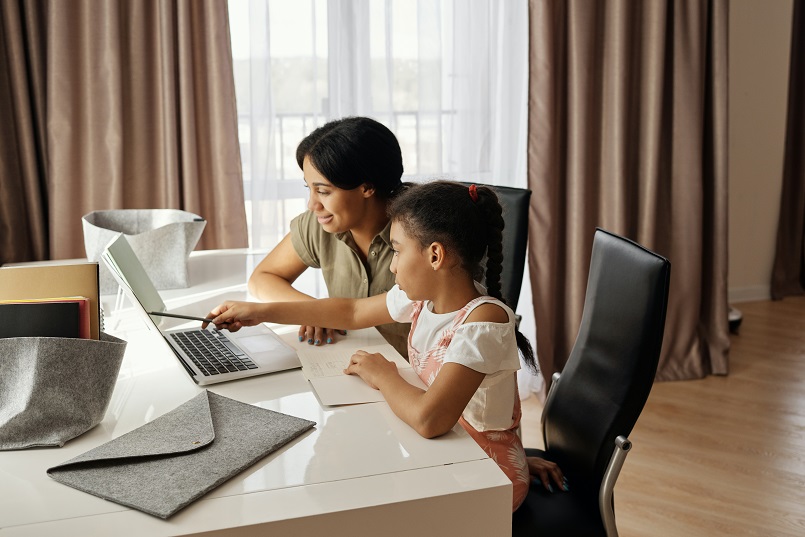When a long-time editor of mine asked for a column on “return to normalcy,” I knew my readers would offer far broader answers than I could give. As another school year approaches, where would their thoughts go, about school schedules, loss of support for this past year, other things on their minds as parents, teachers, or community members, both autistic and non-autistic?

My editor asked, “Is a return to normalcy even possible?” But I asked, even if it’s possible, is it desirable? Should we expect and strive for something better?
I asked the question on social media, and a spectrum of answers lit up my screen. Once again, we meet up with that truest of truisms: If you’ve met one autistic person, you’ve met one autistic person.
Different modes for different learners
“All of this has reinforced that people learn in different ways,” wrote one mom. “Virtual learning worked incredibly well for some and should become a permanent option. For others, like my son, it didn’t work well at all, proving to me that brick and mortar programs need to be an option as well.”
Life coach Hartley Steiner weighed in with “For my five teenagers with various needs, we should not go back to the old ways or ‘normal’. Hopefully we can use this as a jumping-off point to recognize that all kids’ needs are specific to their emotional, academic and mental needs, all so diverse. All kids deserve an IEP that details how they learn best, whether virtual, in person or a hybrid. It’s time to modify our system past its roots of industrial-era mass education based solely on age, and transform it to a modern system where strengths and growing areas are identified individually and classrooms aren’t packed full of kids at such different levels of development and readiness that the gap to teach them en masse is nearly impossible for teachers. I truly hope this is the beginning of something better.”
An autistic mother and educator’s perspective
Suzanne Axelsson, an autistic parent of autistic children, reinforced and elaborated on those thoughts. “My autistic children struggled with remote learning. While some things were easier (not all the disturbing sounds, smells, and over-stimulation of lots of social interactions), other areas were much harder: focus and motivation, especially in subjects that held no interest; not being able to listen properly because some teachers’(lessons) had terrible sound quality.
Axelsson’s children preferred recorded lectures where they could adjust the speed to best enable them to focus. “One child speeds it up, because (s/he) does not have the patience, another has to rewind and listen again because (s/he) keeps losing focus,” she explains. “And the other one needed to pause and do something else for a while, then return to the screen.”
All three preferred the interactive parts where there was dialogue to discuss ideas, especially on topics that interested them. “My youngest had said school focused on only the bits he didn’t like, and the only redeeming feature of school was meeting friends. And suddenly that was the main part ripped from him.
“None of my children liked having school coming into their home. Home has been their safe space, and having school within the home has opened up our home to the very things we have worked hard to protect our children from—the stress, competition, anxiety, and performance demands that school requires and exacts.”
As a lecturer who trains early-childhood educators, Axelsson discussed pros and cons with her students. “So, what I will do is a mix of both—some remote, so they can listen to the lecture online, then meet up in person for the hands-on and dialogue parts.”
But on a personal level? “As an actually autistic person myself, I have missed social interactions to an extent but not in the same way as my husband and many others. All four of us have thrived much better than neurotypicals who seem to have a higher need for social interaction for their own sense of identity and well-being.”
An autistic worker’s perspective
Jeff VR Sexton identifies as an autistic adult and gives us this perspective as a worker and a former student:
“I’ve been working fully remote and can tell you I’m not looking forward to going back into the office, even if I get to maintain the customized schedule my team allowed. Although at home I’ve had many of the same difficulties within my mind that I have in the office, at home I can control my environment far more. I don’t have near the vibrations—my particular sensitivity—in my apartment as are in my office. And when I am having difficult periods, I don’t have to worry about strangers’ reactions, as the only person who will see it at all is my wife, and she is as aware of things as I am, maybe even more so.

Sexton also reflected on his years as a student. “I can also tell you from when I was in school, that this new environment (at home) would have been far better for me. I wound up having a few ‘independent study’ classes in high school due to being expelled and being much further along academically than all of my peers in the alternative school. I did quite well isolated by myself doing my own thing.”
A home-schooling mother’s perspective
“I don’t think ‘going back’ is ever the answer,” Sarah M wrote. “We should be moving forward. If this pandemic taught us anything about the public education system, it’s that it is and has been broken and unprepared for anything unpredictable. This includes autistic, gifted, disabled, poor, and POC children—any child who doesn’t fit the mold of what our education system was built on way back in the day. Churn them out so they can go to work. Teach them all the same thing, the same way, base all learning on memorization and repetition, and have standardized tests to ‘prove’ learning has occurred. Anyone who doesn’t do well or fit that mold will be very obviously either taken out of the classroom at certain times of the day or be separated completely. It didn’t work for my generation or the one before it.
“I do not fault teachers at all for this. In fact, I think teachers should be part of the change moving forward. They are not paid nearly enough. (They’re) overloaded with students that I am sure they would love to give personalized attention to. It’s not right. It’s not working. My daughter isn’t going back. We are doing something new that has worked wonders for her. Going back is not the answer.”
And the final word on “new normalcy”, from an autistic father of an autistic child
“I think social reality is ever-evolving as new information, such as the pandemic effects, enters the system,” responds #ActuallyAutistic Papa via Twitter. “Thus, we will adapt to a more mature reality where rules of the past may no longer apply without a degree of flexibility. That in itself will be a new normalcy.”
© 2021 Ellen Notbohm ellennotbohm.com

Leave A Comment